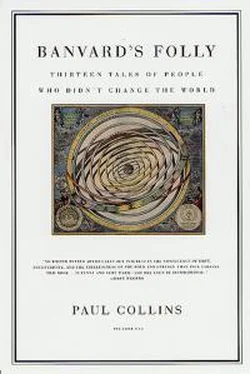Life on the moon!
It seemed too good to be true--and so it was, in the end. But for a few weeks in 1835, it was as real as the newspaper gripped between every American's hands. Readers could thank journalist Richard Locke for the bizarre account of lunar life; but for the even more bizarre thoughts behind them, they had to turn to a shy, self-taught astronomer from Scotland.
Thomas Dick was not born into the contemplative life. In 1774, science was still a gentleman's profession, well out of reach of the likes of Dick's father, a weaver. But the son of this humble weaver had a revelation in 1782, at the age of eight, when he saw a meteorite flash before him in the evening sky. Soon he was spending his workdays at the loom reading borrowed books on astronomy; at night, he ground his own lenses and constructed crude telescopes with pasteboard tubes. He fell among academics and spent much of his early
life teaching, preaching, and promoting, in his words, "literary and philosophical societies adapted to the middling and lower ranks of society."
His youthful interest in astronomy was never lost in all this activity; to the contrary, it became the centerpiece of his lifelong obsession with marrying religion and science. To Dick, the heavens were God's work made visible on a vast scale to earthly inhabitants.
With successful teaching and writing stints behind him, Dick decided at the age of fifty-three to devote himself fully to his lifelong passion. He quit teaching and went to work building a small cottage on a hill near Dundee and fitting it with a library and observatory of his own design. He was by nature a reserved and rather sober man, and the remote perch suited him just fine. By night, he watched the skies, having long since graduated from his apprenticeship of homemade lenses and pasteboard tubes. By day, he wrote books--great masses of them-expounding upon education, prison reform, fire safety, preaching, and most of all astronomy.
He was tremendously popular in the United Kingdom and in the United States, and such luminaries as Emerson, Harriet Beecher Stowe, and William Lloyd Garrison all made pilgrimages to meet him. His massive following came in part because he could write on scientific discoveries for the common man in a way that his learned colleagues never could. But clarity alone doesn't explain his wide popularity. Dick had captured the public imagination with his belief that every single planet, moon, comet, and star was inhabited with intelligent beings. And what was more, he had a fair idea of how to reach them.
While walking across a field, you find a watch on the ground. All the minerals in the earth couldn't have combined together to form a watch on their own; surely this watch must have a watchmaker. Walking farther, you kick up a chunk of quartz. Examined closely, it reveals a fantastic crystalline structure. You assumed the carefully designed watch had a maker; why not the chunk of quartz?
This was the opening argument of William Paley's 1802 work Natural Theology, which lent its name to the entire field that arose in its wake. Though these ideas had been bubbling for some time, it was Paley who spread natural theology to the intelligentsia.
To a natural theologian, the wisdom and moral perfection of God were evidenced in the compact design and utility of every natural object. Today we might see giraffes as the evolutionary survivor of merciless natural selection, winning over dead-end mutations by virtue of being able to eat lofty edible leaves.
But to a natural theologian, a giraffe was evidence of God's kindly hand-creating a plain with high trees, He provided for giraffe welfare by giving their necks a good stretch.
The movement came to a head in the 1830's, when the Cambridge don William Whewell published his Bridgewater Treatise, which allowed and even encouraged the belief that a benevolent God would populate other worlds with beings intelligent enough to appreciate the beauty of His creations. This idea also had some currency in the seventeenth century: the theologian Giordano Bruno was burned at the stake for it in 1600, and both the English bishop John Wilkins and the French scientist Bernard le Bovier de Fontenelle advocated it later that century. Now, though, it was to be revived dramatically by Whewell and fellow scientists like Sir David Brewster. But it was Dick, the humble Scottish astronomer, who went farther than anyone else dared to imagine.
To Dick, the massive workings of the skies were a means to a magnificent and inscrutable end. For it to be otherwise, a means without an end, would reveal our Maker to be a cruel existentialist. The universe would be, as his book The
Sidereal Heavens claims, "one wide scene of dreariness, desolation, horror, and silence, which would fill a spectator from this world with terror and dismay ... without one sentient being to cheer the horrors of the scene." This was clearly unacceptable in a Christian god, as was the "wild hallucination"
that our own life was an accident of primordial chemistry. We did not exist as a result of fortunate material reactions--it existed to please us, a conceit now known as the Anthropic Principle. "Matter," Dick insisted, "was evidently framed for the purpose of mind."
It also followed that having matter anywhere without a sentient being for it to serve would be pointless. Therefore every celestial body must be inhabited.
Intelligent life was more than a mere accident of our planet, or of perhaps one or two others: it was the natural state of the universe. To believe otherwise was "impious, blasphemous, and absurd." Writings like Celestial Scenery are thunderous on this point: "Let us suppose for a moment that the vast regions on the surfaces of the planets are only immense and frightful deserts, devoid of inhabitants-wherein does the wisdom of the Creator appear in the supposition? Would this be an end worthy of INFINITE WISDOM?"
With every world being inhabited, it was natural enough for Dick to first turn his attentions to the moon. By Dick's estimate, if the moon was as crowded as England it would have a population of 4.2 billion. And with every order of life inhabiting every world, he went on in The Sidereal Heavens to use this formula to calculate the population of the visible universe: There would be the following number of inhabitants in these worlds, 60,573,000,000,000,000,000,000,000; that is, sixty quartillions, five hundred and seventy three thousand trillions, a number which transcends human conception. Among such a number of beings, what a variety of orders may exist, from the archangel and the seraph to the worm and the microscopic animaliculum!
But there is no explanation, sadly, of why a benevolent God would want to make every planet as crowded as England.
Given the magnificent intricacy of virtually any object, Dick's thinking naturally led him to believe that every celestial object was inhabited, including comets and asteroids. "Comets may be the abodes of greater happiness than is to be found on our sublunary world," he marveled, "and may be peopled with intelligences of a higher order than the race of man." These comets might be peopled with rather worldly fellows (or rather, cometary fellows), made wise and sophisticated by the vaster and more diverse prospects afforded to them in their long, irregular orbits inside the solar system. He imagined that they might be a race of astronomers, sailing through space in their icy observatory, in eternal contemplation of the planets: "Their movable observatory, cruising from sun to sun, carries them in succession through every different point of view." With keen enough eyes, perhaps these cometary beings could spy upon a whole other order of beings together--the ones, Dick proclaimed, that lived in the interior of the sun.
Dick also believed the rings of Saturn to be solid, in the mistaken belief that mere dust debris would have already been flung into space. Given their solidity, and the sublime views of the planet surface below and the heavens above, Dick thought that surely these rings must be populated with "numerous orders of intellectual beings."
Читать дальше











